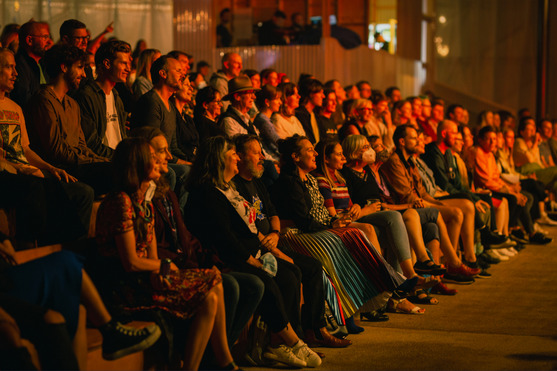
Photos courtesy of the Adelaide Festival
As the Adelaide Festival comes to a close this weekend, it’s been a bumper year for awe-inspiring performances but also access to the arts for people who might otherwise have missed out.
The Balnaves Foundation supports the Adelaide Festival’s Open House program, including Tix for Next to Nix, which provides subsidised tickets for $5 each for pension and health care card holders, and Pay What You Can tickets to selected shows for pension and health care card holders or full-time student card holders.
Amelia Hart, Grants Manager at the foundation, says: “It’s inspiring to see how many people love this festival and how much the demand for the Open House access program has grown year-on-year.
“This year, a record 2,500 tickets were made available through the foundation’s support of Open House, and they sold out two weeks before the festival opened,” she says.
“That’s never happened before. It shows there is a big demand for access to the arts. The cost of living is so high at the moment, this program means many more people are included and exposed to experiences they may not have had before.
“Challenges that people face in accessing the arts include financial, geographical and sometimes misconceptions around who different genres are for. This program aims to break down those barriers as much as possible. Ballet is for everyone, theatre and opera are for everyone, not just for those who can afford it. The arts are for everyone,” says Amelia.
The Adelaide Festival administers the program. “There is a lot of trust between us and the festival, and there was much collaboration in the initial years on how the program would work. The foundation has three focus areas – the arts, education and medicine. With a lens on supporting First Nations, young people and disadvantage, the Open House program touches on a lot of these areas.”
A tranche of tickets was provided this year to school children for a show called Air Play, which combines circus and comedy but has no words. It is said to appeal to young people with sensory processing differences, adding another layer of accessibility to outcomes of the scheme.
The mother of some of the children who attended the performance, Michelle Bell, told the ABC that seeing the performance was the “chance of a lifetime for them. I’ve never been myself so I can’t have that memory, but my girls can.”
Amelia hopes that more and more young people will take up the opportunities offered by the scheme. “Providing access to the arts sparks creativity and different ways of thinking. Having access to something you’ve never seen or heard before – who knows what that will inspire the next generation to do?”
